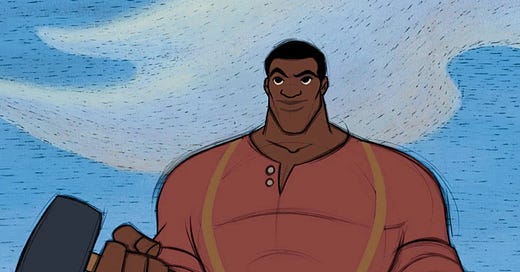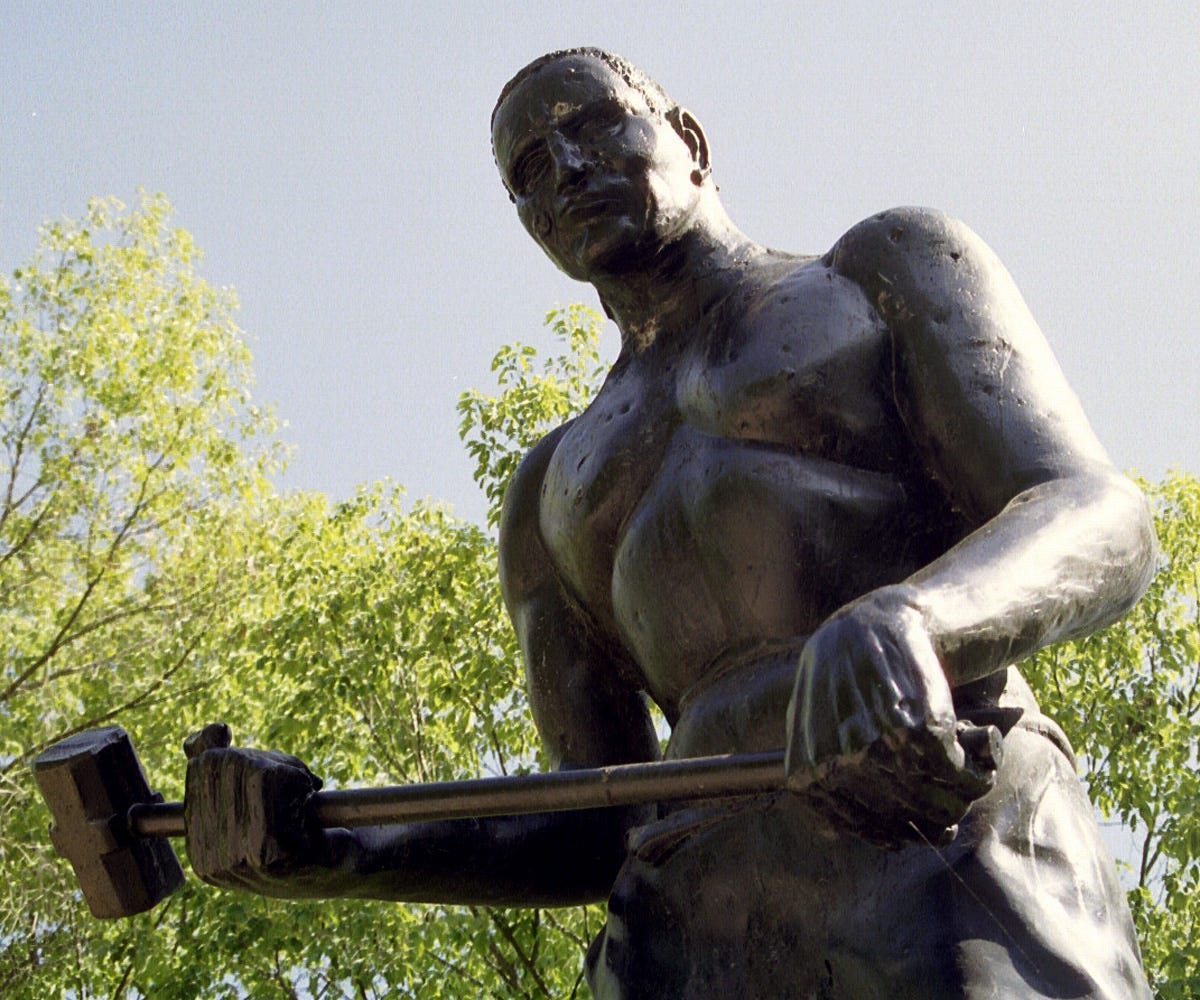Although often described as a social construct, the tenets of traditional masculinity are generally well known and defined. These tenets can vary in its messaging from culture to culture but do emphasize common traits. …’Protect, provide, procreate’…strength, power, independence, taking risks over perceived meekness or weakness, leadership, stoicism… we all know the principles here.
But each culture creates its own definitions based on its own history, traditions, values, norms, and beliefs. While cultures may interact and influence one another, each remains distinct, drawing from its own rich tapestry of experiences and perspectives. In this series titled ‘cultural concepts of masculinity,’ we explore figures, fables, and stories that have emerged as touchstones within their respective communities. From folk heroes to archetypal narratives, these cultural artifacts offer the impact and ingrained nature of masculine constructs across different cultures.
John Henry.
First, we start with the folklore hero John Henry. If pushed to the limits of my childhood memory I could bring up a vague recollection of this story about a man, his hammer, maybe a steamboat? Not a lot to tie the pieces together. I would likely just throw his name in with Paul Bunyan (but black) and call it a day. In brief, the story goes about regarding a man with mythical power and strength (that’s John) who lost his life attaining victory over a steam-powered drill that was going to replace him and his fellow workers. This folk story is one of myth, sacrifice, hard work, and hero-ism.
Link here for more on the folk story of John Henry:
You can find illustrative animation in the Disney short here.
Video titled ‘The VERY Messed up Origins of John Henry’:
John Henryism.
The name and story came to light for me in more recently years during a work talk about low SES populations and chronic stress. A fellow black psychologist threw in the term John Henry-ism at me as we unfailingly try to add on additional, complex layers of culture into the discussion. In an attempt to deepen an already critical, weighty and intelligent talk, I smartly and intriguingly retorted back ‘what the hell does that term mean?’ (emphasis added on for dramatic effect, but really I didn’t know what that term meant).
Here's a Wikipedia article on the term, John Henryism here.
Whereas John Henry's legend embodies the indomitable spirit against insurmountable odds (a good message imo), the term ‘John Henry-ism’ more strongly emphasizes the plight of the working class hero in the face of chronic stress and repeated challenges. Resilience is a great trait, but pushed to its limits, reminds us it is forged under severe conditions, sometimes under unforgivable and long-term distress. The trait can be admirable, but the environment creating it can be inhumane.
So goes the story that John Henry died while working. What reactions does that part of the story elicit for you? Triumph, or tragedy? For me, it strikes a more Shakespearean tragedy rather joyful, after school program as well.
So goes the plight of not just working class (or poverty or oppression all terms you may use instead), and not just the history of many African Americans but also of men and African-American men. From my vantage point, it is absolutely a bastion of masculinity to die for others. To sacrifice everything and to maintain an aura of strength no matter the cost.
But people don’t talk about the resentment that can later turn into regret, entitlement, anger, mistrust, and a ‘me against the world’ mentality. So, here we turn a folk-story into a ‘lessons learned’. Cautionary tale. Don’t work until you die. Take a step back. Acknowledge your work. Acknowledge appreciation for yourself. Assemble, galvanize, and unify your team to continue to carry the burdens of life’s challenges - not just for yourself but for those you are working so hard for. That could be a family, friends, a network, a community or others. Take joy and benefit out of your own story. Enjoy the fruits of your labor. And pass on that wisdom for the next generation to take the next step forward. Because it’s not about you, or your own strength, determination, and ungodly willpower. It’s about who and why you want to put in that superhuman effort for. And if the message shifts from them to your martyrdom and sacrificial efforts, than the good-intentioned reasons are lost in self-gratification of dominant masculinity principles.
Doing all of that does not have to make you soft. It does not have to get your belly full, nor does it need to make you content and satisfied. Doing all of these healthy things can evolve your story, add on from the triumph through sacrifice into something bigger and more beautiful long-term for you, your family or community.
A couple of thoughts and a final reference.
In speaking about cultures that are not my own, I wish to tread as respectfully and accurately as possible. My goal is to highlight these stories and concepts for a larger audience but not to overtake them, come off as an expert on other cultures stories or histories or appropriate them. If you have any feedback or criticisms in either direction, I would receive them happily and humbly.
There are many African-American related concepts and constructs I find interesting for similar reasons, which I’ll briefly reference but may lean more towards culture than masculinity, but I find nonetheless relevant -- messages such as having to work double to get half as much, even the insinuation or optics of doing something wrong could lead to dire consequences, for example. I just want to highlight here some of the plights of a culture and as a minority man that are not always highlighted in the larger discussion on men’s mental health.
Lastly, I want to attach articles or references that have informed my thinking and writings as they related. Below is a 2016 article drawing a connection between chronic social and environmental stressors black men may face, to threats to masculine identity and gendered coping. Gendered coping can include suppression, anger/aggression, unhealthy sexual behaviors, unhealthy food/diet behaviors all of which can be tied to long-term consequences to health and well-being, namely cardiovascular disease and other diseases of death.
https://psycnet.apa.org/doiLanding?doi=10.1037%2F14594-012
Thank you for reading.





